#tillius cimber
Text

The Death of Caesar by Jean-Léon Gérôme
#julius caesar#assassination#ides of march#art#jean léon gérôme#caesar#theatre of pompey#ancient rome#rome#roman#romans#history#assassins#conspiracy#conspirators#senators#dagger#throne#roman republic#curia of pompey#senate#europe#european#brutus#cassius#marcus junius brutus#gaius cassius longinus#decimus junius brutus albinus#tillius cimber#servilius casca
309 notes
·
View notes
Photo




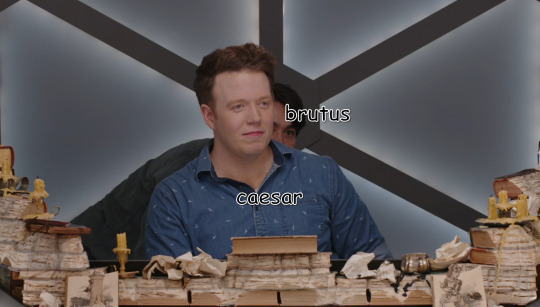

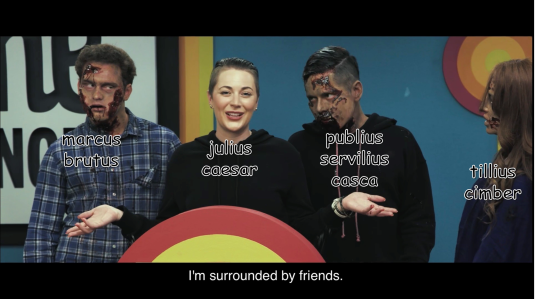


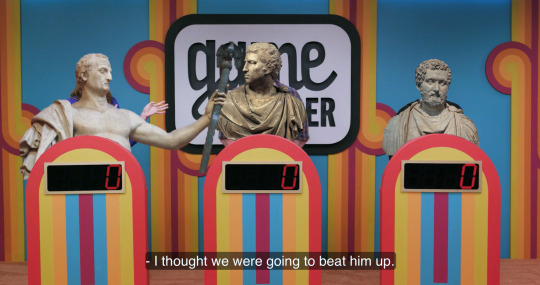
please enjoy me feeding my game changer hyperfixation with some ides of march memes
#ides of march#julius caesar#game changer#lou wilson#brennan lee mulligan#siobhan thompson#zac oyama#josh ruben#sam reich#katie marovitch#carolyn page#dropout#marcus brutus#stabbing caesar day#happy stabbing caesar day#caesar#brutus#publius servilius casca#casca#tillius cimber#cimber#spurinna#i had much fun making these#mine#decimus#decimus albinus#idk why im tagging all these people but i had to do a lot of double checking for close enough historical accuracy#so these names are stuck in my brain#knives
97 notes
·
View notes
Text
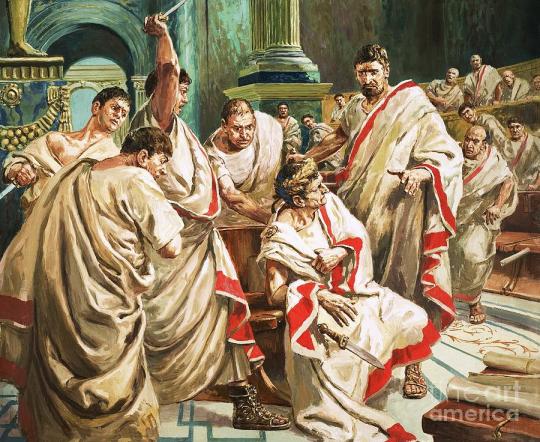
The death of Julius Caesar | ca. 1975 Oil on Canvas
Doughty, C.L. (1913-85)
Beware The Ides of March! One of the most famous moments in classical history as Julius Caesar is assassinated by Brutus, Cassius and their followers in 44 BC.
Caesar was due to appear at a session of the Senate. Mark Antony accompanied Caesar on his way. The plotters, however, fearing that Antony would come to Caesar's aid, had arranged for Trebonius to intercept him just as he approached the portico of Theatre of Pompey, where the session was to be held, and detain him outside. When Antony realized what had come to pass, he fled the scene fearing he might be next.
According to Plutarch, as Caesar arrived at the Senate, Tillius Cimber presented him with a petition to recall his exiled brother. The other conspirators crowded round to offer support. Both Plutarch and Suetonius say that Caesar waved him away, but Cimber grabbed his shoulders and pulled down Caesar's tunic. Caesar then cried to Cimber, "Why, this is violence!" ("Ista quidem vis est!").
At the same time, Casca produced his dagger and made a glancing thrust at the dictator's neck. Caesar turned around quickly and caught Casca by the arm. According to Plutarch, he said in Latin, "Casca, you villain, what are you doing?" Casca, frightened, shouted, "Help, brother!" in Greek. Within moments, the entire group, including Brutus, was striking out at the dictator. Caesar attempted to get away, but, blinded by blood, he tripped and fell; the men continued stabbing him as he lay defenceless on the lower steps of the portico. According to Eutropius, around 60 or more men participated in the assassination. He was stabbed 23 times.
Caesar's body was cremated, and on the site of his cremation the Temple of Caesar was erected a few years later. Only its altar now remains. A lifesize wax statue of Caesar was later erected in the forum displaying the 23 stab wounds. A crowd who had gathered there started a fire, which badly damaged the forum and neighboring buildings.
#gaius julius caesar#ides of march#julius caesar#mark antony#rome#roman history#ancient rome#roman republic#roman empire#art history#oil painting#brutus#marcus brutus
35 notes
·
View notes
Text
caesar assination that happen only in march 15 every year in tumblr but i copypaste from wikipedia
Assassination
Main article: Assassination of Julius Caesar
On the Ides of March (15 March; see Roman calendar) of 44 BC, Caesar was due to appear at a session of the Senate. Several senators had conspired to assassinate Caesar. Mark Antony, having vaguely learned of the plot the night before from a terrified liberator named Servilius Casca, and fearing the worst, went to head Caesar off. The plotters, however, had anticipated this and, fearing that Antony would come to Caesar's aid, had arranged for Trebonius to intercept him just as he approached the portico of the Theatre of Pompey, where the session was to be held, and detain him outside (Plutarch, however, assigns this action of delaying Antony to Brutus Albinus). When he heard the commotion from the Senate chamber, Antony fled.[128]
According to Plutarch, as Caesar arrived at the Senate, Tillius Cimber presented him with a petition to recall his exiled brother.[129] The other conspirators crowded round to offer support. Both Plutarch and Suetonius say that Caesar waved him away, but Cimber grabbed his shoulders and pulled down Caesar's toga. Caesar then cried to Cimber, "Why, this is violence!" ("Ista quidem vis est!").[130]
The senators encircle Caesar, a 19th-century interpretation of the event by Carl Theodor von Piloty.
Casca simultaneously produced his dagger and made a glancing thrust at Caesar's neck. Caesar turned around quickly and caught Casca by the arm. According to Plutarch, he said in Latin, "Casca, you villain, what are you doing?"[131] Casca, frightened, shouted, "Help, brother!" in Greek ("ἀδελφέ, βοήθει", "adelphe, boethei"). Within moments, the entire group, including Brutus, was striking out at him. Caesar attempted to get away, but, blinded by blood, he tripped and fell; the men continued stabbing him as he lay defenceless on the lower steps of the portico. According to Eutropius, around 60 men participated in the assassination. He was stabbed 23 times.[132]
According to Suetonius, a physician later established that only one wound, the second one to his chest, had been lethal.[133] Caesar's last words are not known with certainty, and are a contested subject among scholars and historians. Suetonius reports that others have said Caesar's last words were the Greek phrase "καὶ σύ, τέκνον;"[134] (transliterated as "Kai sy, teknon?": "You too, child?" in English). However, Suetonius' own opinion was that Caesar said nothing.[135]
Plutarch also reports that Caesar said nothing, pulling his toga over his head when he saw Brutus among the conspirators.[136] The version best known in the English-speaking world is the Latin phrase "Et tu, Brute?" ("And you, Brutus?", commonly rendered as "You too, Brutus?");[137][138] best known from Shakespeare's Julius Caesar, where it actually forms the first half of a macaronic line: "Et tu, Brute? Then fall, Caesar." This version was already popular when the play was written, as it appears in Richard Edes' Latin play Caesar Interfectus of 1582 and The True Tragedie of Richarde Duke of Yorke & etc. of 1595, Shakespeare's source work for other plays.[139]
The Death of Caesar, Jean-Léon Gérôme, 1867
According to Plutarch, after the assassination, Brutus stepped forward as if to say something to his fellow senators; they, however, fled the building.[140] Brutus and his companions then marched to the Capitol while crying out to their beloved city: "People of Rome, we are once again free!" They were met with silence, as the citizens of Rome had locked themselves inside their houses as soon as the rumour of what had taken place had begun to spread. Caesar's dead body lay where it fell on the Senate floor for nearly three hours before other officials arrived to remove it.
Caesar's body was cremated. A crowd that had gathered at the cremation started a fire, which badly damaged the forum and neighbouring buildings. On the site of his cremation, the Temple of Caesar was erected a few years later (at the east side of the main square of the Roman Forum). Only its altar now remains.[141] A life-size wax statue of Caesar was later erected in the forum displaying the 23 stab wounds.
In the chaos following the death of Caesar, Antony, Octavian (later Augustus Caesar), and others fought a series of five civil wars, which would culminate in the formation of the Roman Empire.
3 notes
·
View notes
Text
La Morte Di Cesare 1797 edition
A list of changes compared with 1791 edition (which I think is close to 1788 premiere, but I do not know what differences there are between them because I have not seen the earliest libretto). Scene numeration, when differs, is given in the format [1791 version]/[1797 version]. The 1797 edition is shorter and divided into two acts, as opposed to the original three.
General comparison by Martha Feldman:
"Many passages that had been done as simple recitative in Bianchi’s 1788–89 setting for the Teatro San Samuele in Venice were cut, raising the dramatic pitch, while added passages of broken obbligato recitative intensified the possibilities of psychological verisimilitude. By dwelling on Brutus’s vain attempts to dissuade Caesar from his tyrannical course, the 1797 version could enhance the effect of “realism” and prepare audiences for the shocking end of the opera, when Caesar would be murdered onstage (unlike the 1789 version or the revivals of 1790 and 1791 mounted in Livorno, Reggio, and Milan). The love talk originally given by Sertor to Calphurnia (Calfurnia) shortly before Caesar’s death was cut for Venice, in keeping with the more graphic ending, while interruptions to the narrative flow, such as Caesar’s three-stanza love aria to Calphurnia in the penultimate scene, were eliminated. Indeed, the ending did more than merely prepare the audience. It facilitated the intended identifi cation of the spectators with the political situation depicted by calling on a popular chorus as co-conspirators. Just before Brutus deals Caesar a mortal blow, the chorus intervenes to urge his death with shouts of liberty, and then cries out, “O morte, o libertà,” culminating in the requisite “Viva la libertà!”"
- Martha Feldman, Opera and Sovereignty
Personaggi.
Added characters: Tilio (Tillius Cimber) and Casca. However, they appear only in the last scene and have just one line (Tilio) if not zero (Casca).
Act 1.
Scene 1 - no changes. Cassius, Porcia, and Albinus as mean girls.
Scene 2 - cut some of the quarrel with Antony (including Porcia wishing that Caesar perish and Cassius seconding this).
Scene 3 - cut the gay praise of Brutus by Cassius. Fair, nothing to praise him for yet.
Scene 4 - cut Calpurnia's amorous arioso and changed her lines to more foreboding ones. Good for her.
Scene 5 - no changes.
Scene 6 - cut Porcia's dissimulating response to Caesar. This version's Porcia comes across as more straightforward in comparison: she does not even pretend civility towards Caesar. This comes at a price of her having less lines in general.
Scene 7 - about a page of dialogue cut, on Caesar's ambition, new war plans, and Parthians.
Scene 8 - replaced Porcia's aria with another one. Comparison.
Scene -/9 - a scene between Caesar and Calpurnia that does not exist in 1791 edition: Calpurnia asks Caesar to stay in Rome and do not leave for a new war, but to no avail.
Scene 9/10 - Caesar's lines about ungrateful Rome cut.
Scene 10/11 - no changes. Cassius yelling at Caesar in all his glory.
Scene 11/12 - Brutus' argument with Caesar shortened.
Scene 12/13 - no changes.
Act 2.
Scene 1 - Porcia's lines about the victims of civil war cut. Interesting in combination with Porcia's replaced aria in act 1 (the original aria was about avenging her father). Not sure how the topic of past victims connects with Venetian situation in summer 1797 and whether this cut is significant.
Scene 2 - no changes.
Scene 3 - dialogue between Cassius and Brutus cut (Cassius says that Caesar's "gifts" of praetorship have less than noble purpose, Brutus doubts it).
Scene 4 - no changes.
Scene 5 - some of Calpurnia's anxious lines cut. Her no less anxious arioso is replaced by the direct plea to Brutus to go and save Caesar (love the irony).
Scene -/6 - does not exist in 1791 version. Brutus, alone, sings an aria about his conflicted feelings (between the acting of a dreadful thing and the first motion... you know how it is).
Scene 6/7 - the temple scene. Interesting sestetto with chorus, featuring the cringefail crown offer by Antony (in both versions). Part of dialogue shortened. Antony's aside went to Albinus (perhaps the 1791 editoon assigned it to Antony mistakenly, not sure). Caesar's reproach to the Roman people got cut: "In voi, che schiavi / Di Mario e di Pompeo muti stareste / Dinanzi a loro, e che a insultarmi invita / La mia bontà, la resistenza giunge / Al disprezzo, all'oltraggio, e a tollerarne / Uso non sono". It is the third of Caesar's reproaches to the populace that got cut (see I.9 and I.11). I think critizising "the crowd" fell completely out of fashion in "revolutionary" Venice (1797).
Scene 7/8 - conspirators' dialogue significantly shortened (mostly Brutus' internal conflict), Brutus' aria cut. Scene II.6 of 1797 edition already covered this topic and gave Brutus a new aria.
Scene 8/- - does not exist in 1797 edition. The scene of Calpurnia sleeping while the ballet represents her prophetic dream (the statue of Pompey stabbing Caesar).
Scene 9 - Calpurnia relating her dream to Caesar cut entirely (meaning that in 1797 production we neither see nor hear Calpurnia's dream). Dialogue between Calpurnia and Caesar shortened, love duet replaced with Calpurnia's anxious aria.
In 1791 edition, Act 2 end here. In 1797, it continues up until the end.
Scene III.1/II.10 - Caesar deliberating whether to go to the senate. No changes.
Scene III.2/II.11 - Brutus confronts Caesar, great references to Catone in Utica. Shortened by four lines or so, but not much.
Scene III.3/II.12 - no changes.
Scene III.4/- - does not exist in 1797 version. Calpurnia reproaches Antony for letting Caesar go out alone, since she fears an attempt on his life (another passage about ungrateful Rome).
Scene III.5/II.13 - the oath of the conspirators outside the curia. No changes.
Scene III.6/II.14 - outside the curia, Caesar is presented with a letter about the conspiracy. Shortened by a few lines of Albinus.
Scene III.7/II.15 - much shortened in 1797 edition. Suspense! Ironically, as Caesar is about to read the letter, Calpurnia distracts him with her own warnings about bad omens, which leads to him entering the curia without having read it.
Scene III.8/- - does not exist in 1797 edition. Porcia, Calpurnia, and Antony wait on the stairs to the curia and hear Caesar being killed inside.
Scena ultima - this is where it gets fascinating, because they are two completely different scenes.
In 1791 edition, the opera ends with Antony and Caesar's Spanish guards calling for revenge against conspirators while Calpurnia is crying.
In 1797, the last scene is inside the curia. Brutus (not Cassius) invokes the unavenged ghosts of Cato and Pompey, who "even from the grave make the voices of liberty resound". Caesar straight up tells everyone gathered that liberty, both ideal and practical, is off the table. Having proclaimed this, he gets stabbed to death. The chorus sings a hymn to liberty. Sadly, the libretto does not have Porcia reappear for the finale (but I have a vision in my head so I choose to believe she is there).
1 note
·
View note
Text
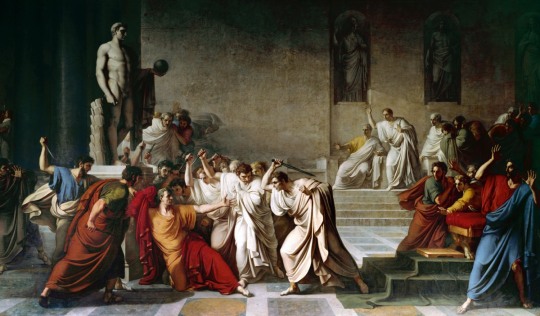
Jean-Léon Gérôme - The Death of Caesar
English: Julius Caesar was assassinated in Rome on the Ides of March (March 15), 44 BC. Characteristically, Gérôme has depicted not the incident itself, but its immediate aftermath. The illusion of reality that Gérôme imparted to his paintings with his smooth, polished technique led one critic to comment, "If photography had existed in Caesar's day, one could believe that the picture was painted from a photograph taken on the spot at the very moment of the catastrophe."
Italiano: Giulio Cesare è stato assassinato a Roma alle Idi di Marzo (15 Marzo 15), 44 a.C. Gérôme dipinse non il fatto in se, ma i momenti immediatamente seguenti. L'illusione di realtà che Gérôme infonde ai suoi dipinti con la propria tecnica morbida e pulita portò alcuni critici a commentare, "Se la fotografia fosse esistita al tempo di Cesare, si potrebbe credere che il quadro fosse dipinto in base alla foto presa sul luogo nel momento della catastrofe."
Depicted people
Julius Caesar
Marcus Junius Brutus
Depicted place Theatre of Pompey
Date between 1859 and 1867
https://commons.wikimedia.org/wiki/File:Jean-L%C3%A9on_G%C3%A9r%C3%B4me_-The_Death_of_Caesar-_Walters_37884.jpg
Artist Jean-Léon Gérôme (1824–1904)
Title The Death of Caesar
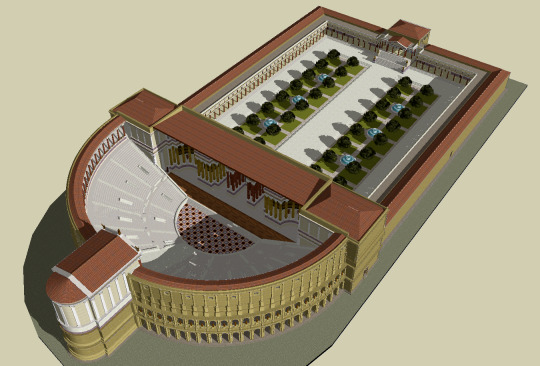
The Death of CaesarA vivid portrait of one of history’s most momentous conspiracies.
History Today | Published in History Today Volume 69 Issue 7 July 2019
A huddle of conspirators walks away from the lifeless, bloodied body of Julius Caesar, having stabbed the great Roman general and statesman 23 times on the Ides, or 15th, of March, 44 BC.
Caesar had recently been declared dictator perpetuo by a Senate fearful of its rumoured abolition in a series of reforms by Caesar, who had a substantial following among Rome’s Plebeians. Senators, of whom Cassius and Brutus were most prominent, had formed themselves into a grouping, the Liberatores, in an attempt to restore the Republic.
Caesar had recently announced his impending departure on a military campaign to subdue the Parthian Empire. If action was to be taken by the conspirators, now was the moment.
The setting for Caesar’s assassination was to be the Theatre of Pompey, where Brutus had organised a series of gladiatorial contests, to which he had invited the dictator. Caesar had been warned of various plots on his life, but Brutus persuaded him that the Senate would be disappointed if he did not attend. His ally Mark Antony, similarly suspicious, tried to intervene, but he was detained outside the theatre by the plotter Servilius Casca.
On his arrival, Caesar was presented with a petition by Lucius Tillius Cimber for the return of his exiled brother. When Caesar refused, Cimber manhandled Caesar, pulling down his toga. As Caesar cried ‘this is violence’, Casca thrust a dagger at his neck – and then the mob struck. Blinded by the torrent of blood that poured from his wounds, Caesar fell on the steps of the Curia.
His last words have been subject to centuries of speculation. He did not say the Shakespearean ‘Et tu, Brute’, but he may have uttered, as the Roman chronicler Suetonius claimed, ‘You too, child’.
The conspirators headed for the Capitol but were met by a bewildered, fearful crowd, who began a destructive fire. Civil war followed and the conspirators, led by Cassius and Brutus, were defeated at the Battle of Philippi in Macedonia in 42 BC by forces under the command of Mark Antony and Caesar’s nominated successor, Gaius Octavius, who became the Emperor Augustus Caesar. Augustus declared his predecessor a god – Divus Iulius – the same year.
The Death of Caesar, by Jean-Léon Gérôme, was painted for the Exposition Universelle of 1867, held in Paris. It hangs in Baltimore’s Walters Art Gallery.
+
4 notes
·
View notes
Text

Out of the Ordinary Friday (O.O.T.O. Friday in short) is a weekly resource post to help you come up with anems for your many, many pixel people. And it’s a chance for You to finally tell people about the weird, puzzling, cool, amazing, beautiful names you come across in your daily life!
If you have names you want to share with the world, do drop by the hypesquads ask box and submit whatever out of the ordinary name you came across. Your submission will be cited, if you give the Hypesquad the chance.
Please only submit first names.
Please note:
This category is NOT a place to start or continue bullying campaigns, to do call outs, or to be classist/racist/sexist about cultural naming conventions.
If such behaviour is noted by the Hypesquad team, consequences will follow.
And now to this week’s names names!
Marcus Junius Brutus
Gaius Cassius Longinus
Gaius Trebonius
Lucius Tillius Cimber
Publius Servilius Casca Longus
Servilius Casca
Servius Sulpicius Galba
Pontius Aquila
Quintus Ligarius
Lucius Minucius Basilus
Gaius Cassius Parmensis
Caecilius
Bucilianus
Rubrius Ruga
Marcus Spurius
Publius Sextius Naso
Petronius
Publius Turullius
Pacuvius Labeo - thank you, @ Gaius Julius Caesar
Enoch
Laurentiu
Lynoure
Wido
Belzade - thank you, @goody2chouxs
Aicha
Hadis
Ekkhard - thank you, anon/s
1 note
·
View note
Text
"As he took his seat, the conspirators gathered about him as if to pay their respects, and straightway Tillius Cimber, who had assumed the lead, came nearer as though to ask something; and when Caesar with a gesture put him off to another time, Cimber caught his toga by both shoulders; then as Caesar cried, "Why, this is violence!" one of the Cascas stabbed him from one side just below the throat. Caesar caught Casca's arm and ran it through with his stylus, but as he tried to leap to his feet, he was stopped by another wound. When he saw that he was beset on every side by drawn daggers, he muffled his head in his robe, and at the same time drew down its lap to his feet with his left hand, in order to fall more decently, with the lower part of his body also covered. And in this wise he was stabbed with three and twenty wounds, uttering not a word, but merely a groan at the first stroke, though some have written that when Marcus Brutus rushed at him, he said in Greek, "You too, my child?" All the conspirators made off, and he lay there lifeless for some time, and finally three common slaves put him on a litter and carried him home, with one arm hanging down. And of so many wounds none turned out to be mortal, in the opinion of the physician Antistius, except the second one in the breast."
-Suetonius' The Twelve Caesars, Julius Caesar paragraph 82
15 notes
·
View notes
Text
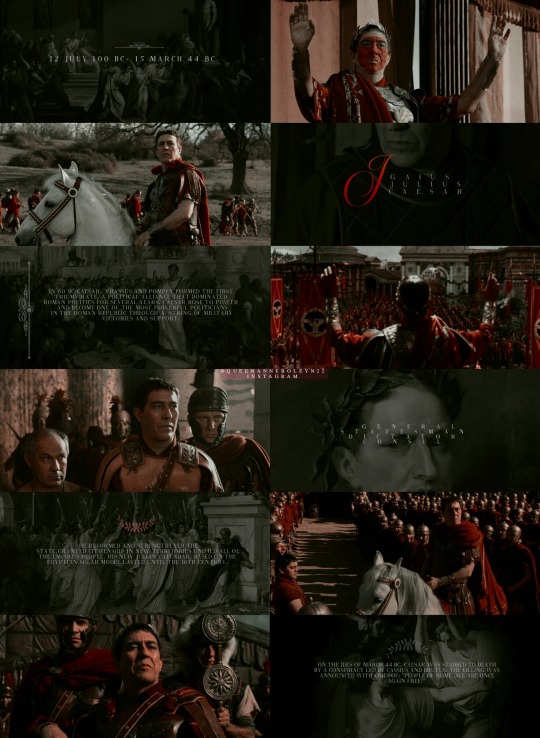
"Hail, Caesar, those who are about to die salute thee."
"As he took his seat, the conspirators gathered about him as if to pay their respects, and straightway Tillius Cimber,note who had assumed the lead, came nearer as though to ask something. When Caesar with a gesture put him off to another time, Cimber caught his toga by both shoulders. As Caesar cried, "Why, this is violence!", one of the Cascas stabbed him from one side just below the throat. Caesar caught Casca's arm and ran it through with his stylus, but as he tried to leap to his feet, he was stopped by another wound. When he saw that he was beset on every side by drawn daggers, he muffled his head in his robe, and at the same time drew down its lap to his feet with his left hand, in order to fall more decently, with the lower part of his body also covered. And in this wise he was stabbed with three and twenty wounds, uttering not a word, but merely a groan at the first stroke, though some have written that when Marcus Brutus rushed at him, he said in Greek, "You too, my child?"
All the conspirators made off, and he lay there lifeless for some time, until finally three common slaves put him on a litter and carried him home, with one arm hanging down. And of so many wounds none, in the opinion of the physician Antistius, would have proved mortal except the second one in the breast."
-Seutonius: "Lives of the Twelve Caesars"("Caesar" 80-82)
#perioddramaedit#history#edit#history edit#mine#roman empire#spqr#julius caesar#gaius julius caesar#rome#roman history#roman emperor#marcus brutus#ides of march#15th march#44bc#rome hbo#ancient rome#ancient history#romans#seutonius#lives of the twelve caesars#graphic#historical figures#Ciarán Hinds#bbelcher#movieedit#romeedit#qab22
126 notes
·
View notes
Text

The Murder of Caesar by Karl von Piloty
#julius caesar#assassination#art#karl von piloty#caesar#ancient rome#ides of march#theatre of pompey#rome#roman#romans#brutus#tillius cimber#servilius casca#cassius#dagger#toga#history#antiquity#europe#european#roman republic#conspiracy#conspirators#assassins#assassin
130 notes
·
View notes
Photo
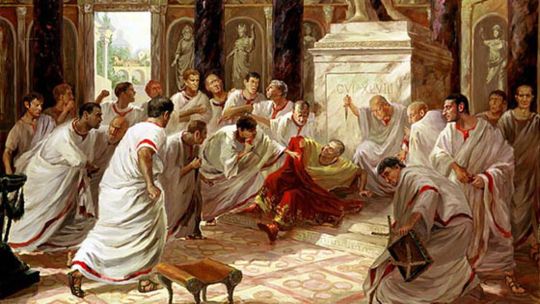
On the Ides of March, March 15, 44 BC, the conspirators staged a game of gladiatorial sport at Pompey’s theatre. The gladiators were provided by Decimus Brutus in case their services were needed. They waited in the great hall of the theatre’s quadriportico. Mark Antony, having vaguely learned of the plot the night before from a terrified Liberator named Servilius Casca, and fearing the worst, went to head Caesar off at the steps of the forum. However, the group of senators intercepted Caesar just as he was passing the Theatre of Pompey, located in the Campus Martius and directed him to a room adjoining the east portico of the Theater of Pompey.
According to Plutarch, as Caesar arrived at the Senate, Lucius Tillius Cimber presented him with a petition to recall his exiled brother. The other conspirators crowded round to offer their support. Both Plutarch and Suetonius say that Caesar waved him away, but Cimber grabbed Caesar’s shoulders and pulled down Caesar’s toga. Caesar then cried to Cimber, “Why, this is violence!”. At the same time, Casca produced his dagger and made a glancing thrust at the dictator’s neck. Caesar turned around quickly and caught Casca by the arm. According to Plutarch, he said in Latin, “Casca, you villain, what are you doing?" Casca, frightened, shouted "Help, brother!”. Within moments, the entire group, including Brutus, were stabbing the dictator. Caesar attempted to get away, but, blinded by blood in his eyes, he tripped and fell; the men continued stabbing him as he lay defenseless on the lower steps of the portico. According to Eutropius, sixty or more men participated in the assassination. Caesar was stabbed 23 times.
77 notes
·
View notes
Photo
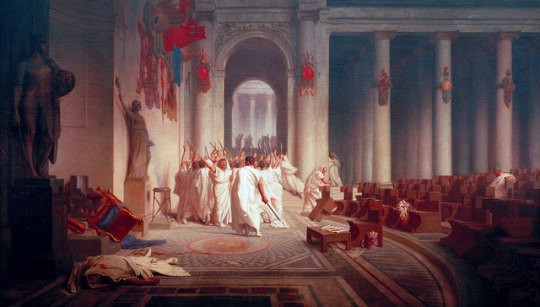
The Death of Caesar, by Jean-Léon Gérôme, 1867
“On his arrival, Caesar was presented with a petition by Lucius Tillius Cimber for the return of his exiled brother. When Caesar refused, Cimber manhandled Caesar, pulling down his toga. As Caesar cried ‘this is violence’, Casca thrust a dagger at his neck – and then the mob struck.
Blinded by the torrent of blood that poured from his wounds, Caesar fell on the steps of the Curia.His last words have been subject to centuries of speculation. He did not say the Shakespearean ‘Et tu, Brute’, but he may have uttered, as the Roman chronicler Suetonius claimed, ‘You too, child’.”
#shakespeare#william shakespeare#kai su teknon#julius caesar#caesar#brutus#art#painting#casca#in this place#history#history today
7 notes
·
View notes
Text
Me On Ellen
Ellen: So I heard you like Julius Caesar
Me: haha yeah, I do
*Cimber Tillius grabs my shirt*
Me: omg Ellen you didn’t
8 notes
·
View notes
Text
just conspirator things: "I carry a master? I cannot carry my liquor!"
{Lucius Tillius Cimber;
Seneca, Letter 83: On drunkenness}
2 notes
·
View notes
Quote
[82] As he took his seat, the conspirators gathered about him as if to pay their respects, and straightway Tillius Cimber, who had assumed the lead, came nearer as though to ask something. When Caesar with a gesture put him off to another time, Cimber caught his toga by both shoulders. As Caesar cried, "Why, this is violence!", one of the Cascas stabbed him from one side just below the throat. Caesar caught Casca's arm and ran it through with his stylus, but as he tried to leap to his feet, he was stopped by another wound. When he saw that he was beset on every side by drawn daggers, he muffled his head in his robe, and at the same time drew down its lap to his feet with his left hand, in order to fall more decently, with the lower part of his body also covered. And in this wise he was stabbed with three and twenty wounds, uttering not a word, but merely a groan at the first stroke, though some have written that when Marcus Brutus rushed at him, he said in Greek, "You too, my child?"
All the conspirators made off, and he lay there lifeless for some time, until finally three common slaves put him on a litter and carried him home, with one arm hanging down. And of so many wounds none, in the opinion of the physician Antistius, would have proved mortal except the second one in the breast.
Suetonius, The Twelve Caesars
5 notes
·
View notes

